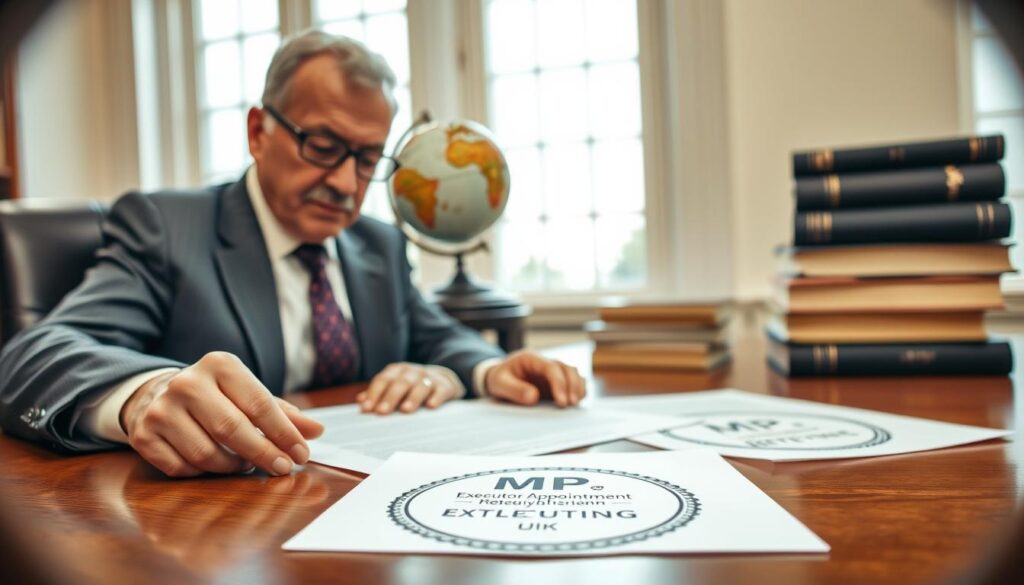When a loved one dies abroad, managing their assets in England and Wales can be challenging. A significant number of individuals hold assets across borders, making it crucial to understand the legal steps required to administer these assets effectively.
One critical process is resealing a foreign grant, which allows the personal representative to manage the deceased’s assets in the UK. We will guide you through the importance of this process and the steps to apply for it.
Key Takeaways
- Understand when resealing a foreign grant is necessary for managing assets in England and Wales.
- Learn the steps involved in applying for resealing a grant.
- Discover the importance of seeking professional advice in this complex process.
- Find out how resealing a foreign grant impacts the administration of the deceased’s assets.
- Gain insights into the documentation required for a successful application.
Understanding Foreign Grants of Probate
When dealing with the estate of a deceased individual who held assets in multiple countries, understanding the concept of a foreign grant of probate is crucial. A foreign grant of probate is a legal document issued by a court in a country other than the UK, which confirms the validity of a will and authorizes the executor to manage the deceased’s estate.
What is a Grant of Probate?
A grant of probate is an official document that allows a personal representative to manage the money, property, and assets left behind when someone dies and distribute them according to their will. It is a critical step in the estate administration process, providing the necessary legal authority to deal with the deceased’s assets.
The grant of probate is typically issued by a court in the jurisdiction where the deceased lived or held significant assets. For individuals with assets in multiple countries, this can involve obtaining a grant of probate in each relevant jurisdiction.
Types of Foreign Grants of Probate
There are several types of foreign grants of probate, each with its own specific characteristics and implications:
- Grant of Probate issued in Commonwealth countries: These are often recognized in the UK due to reciprocal arrangements.
- Grant of Probate issued in non-Commonwealth countries: These may require additional steps, such as resealing, to be recognized in the UK.
- Grant of Probate issued in EU countries: Although the UK has left the EU, existing grants may still be recognized under certain conditions.
Understanding the type of foreign grant of probate is essential for determining the next steps in managing the deceased’s estate in the UK, including whether the grant needs to be resealed.
Why Reseal a Foreign Grant of Probate?
Resealing a foreign grant of probate allows the personal representative to deal with the deceased’s assets in England and Wales. This process is crucial when the deceased person held assets in the UK, and their foreign grant of probate needs to be recognized locally.
Legal Recognition in the UK
Resealing a foreign grant of probate provides legal recognition of the grant in the UK, enabling the personal representative to administer the estate according to the deceased’s will. Without this recognition, the personal representative may face significant challenges in managing UK assets.
The resealing process involves the UK Probate Registry placing a new seal on the foreign grant, effectively making it a legal document in England and Wales. This step is essential for banks, building societies, and other financial institutions to release the deceased’s assets.
Facilitating Asset Distribution
Resealing a foreign grant of probate facilitates the distribution of the deceased’s assets according to their will. By obtaining a resealed grant, the personal representative can:
- Access and manage the deceased’s UK bank accounts and other financial assets.
- Sell or transfer property in England and Wales.
- Distribute the estate according to the deceased’s wishes as stated in their will.
The following table summarizes the key benefits of resealing a foreign grant of probate:
| Benefit | Description |
|---|---|
| Legal Recognition | The resealed grant is recognized as a legal document in England and Wales. |
| Asset Access | Enables access to the deceased’s UK assets, such as bank accounts and property. |
| Estate Distribution | Facilitates the distribution of the estate according to the deceased’s will. |
By resealing a foreign grant of probate, personal representatives can efficiently manage the deceased’s estate in the UK, ensuring that the deceased’s wishes are respected and their assets are distributed accordingly.
Eligibility for Resealing Process
To reseal a foreign grant of probate, one must first understand the eligibility criteria set forth by UK law. The process is governed by the Colonial Probates Act, which permits resealing for grants issued in certain Commonwealth countries.
Criteria for Foreign Grants
The original grant of probate (or its equivalent) must be issued in one of the countries named in the Colonial Probates Act. This typically includes old Commonwealth countries. We must verify that the grant was issued by a court or authority recognized under UK law.
Key criteria for eligibility include:
- The grant must be original or a certified copy.
- It must be issued by a court or authority in a recognized Commonwealth country.
- The grant must be valid and in force at the time of application.
Who Can Apply for Resealing?
Typically, the executor named in the foreign grant of probate or their legal representative can apply for resealing in the UK. This involves submitting an application to the relevant UK court, usually the Principal Probate Registry or a district probate registry.
For more detailed information on the role of an executor and their duties, you can refer to our guide on executor duties explained.
It’s essential to ensure that the applicant has the legal authority to act on behalf of the estate. This may involve providing documentation that proves their appointment as executor or administrator of the estate.

By understanding and meeting these eligibility criteria, individuals can successfully navigate the process of resealing a foreign grant of probate in the UK, facilitating the administration of international estates.
The Resealing Process: An Overview
The process of resealing a foreign grant of probate is essential for legally recognizing your authority in the UK. This step is crucial when dealing with assets located in the UK that were part of a deceased person’s estate who had a grant of probate issued in another country.
Initial Steps to Take
To begin the resealing process, we first need to prepare and file an Inheritance Tax (IHT) return with HM Revenue and Customs and pay any required taxes. This step is vital as it ensures that the necessary taxes are paid before the assets can be distributed.
We recommend gathering all relevant financial information and documentation related to the estate to complete the IHT return accurately. This includes details of the deceased’s assets, debts, and any gifts made in the seven years preceding their death.
Required Documentation
To reseal a foreign grant of probate, we need to provide specific documentation. The primary documents required include:
- The original grant of probate issued by the foreign court
- A certified copy of the grant of probate
- Certified translations of the documents if they are not in English
- Identification documents for the executors or administrators
For a smooth application process, it’s crucial that all documents are correctly prepared and submitted. You can find more detailed information on the required documentation on the Osbornes Law website.
Below is a summary of the key documents and their purposes:
| Document | Purpose |
|---|---|
| Original Grant of Probate | Proves the authority of the executors or administrators |
| Certified Copy of Grant | Verifies the authenticity of the original grant |
| Certified Translations | Ensures that non-English documents are understood by UK authorities |
| Identification Documents | Confirms the identity of the executors or administrators |

By understanding the initial steps and required documentation, we can efficiently navigate the resealing process. This ensures that the estate is administered correctly and that the beneficiaries receive their inheritance without unnecessary delays.
Necessary Documentation for Resealing
When applying to reseal a foreign grant of probate in the UK, it’s crucial to understand the necessary documentation required for a smooth process. The documentation serves as the foundation for a successful application, ensuring that the legal and administrative aspects are properly handled.
Original Grant of Probate
The original foreign grant or an official court sealed copy is a critical document. This must be obtained from the relevant authorities in the country where the grant was initially issued. We recommend verifying the authenticity of the document to avoid any delays in the resealing process.
Certified Translations of Documents
If the documents are not in English, certified translations will be required. This ensures that the UK courts can understand the content of the documents. It’s essential to work with a reputable translation service to guarantee accuracy and compliance with UK legal standards.
Identification Requirements
An official copy of the death certificate and the will are also necessary. These documents help verify the deceased’s identity and their wishes regarding the distribution of their estate. For more information on the process, you can refer to resealing a foreign grant of probate and the estate administration process.
The following table summarises the necessary documentation:
| Document | Description | Requirement |
|---|---|---|
| Original Grant of Probate | Official court sealed copy | Mandatory |
| Death Certificate | Official copy | Mandatory |
| Will | Original or certified copy | Mandatory |
| Certified Translations | For non-English documents | Conditional |

Ensuring that all required documents are in order will significantly streamline the resealing process. It’s also advisable to consult with legal professionals to guarantee that all documentation meets the necessary standards.
Where to Apply for Resealing
The UK’s Probate Registry is the key institution for resealing foreign grants of probate, but knowing how to apply is essential. The application for resealing is made to the Probate Registry, which is part of HM Courts Service.
Appropriate Courts in the UK
In the UK, the Probate Registry has specific offices that handle resealing applications. The main offices are located in:
- London
- Birmingham
- Manchester
- Oxford
- Brighton
It’s crucial to identify the correct office based on your location or the deceased’s assets. You can find more information on the UK Government’s website about the specific Probate Registry offices and their contact details.
Online vs. In-Person Applications
Applicants have the option to apply either online or in-person, depending on their preference and circumstances.
| Application Method | Pros | Cons |
|---|---|---|
| Online Application | Convenient, can be done from anywhere, faster processing times | Requires digital copies of documents, technical issues possible |
| In-Person Application | Personal support available, original documents can be submitted directly | Requires a visit to the Probate Registry, potentially longer processing times |
Choosing the right application method depends on your specific needs and the complexity of the estate.

For a smooth application process, ensure you have all necessary documents ready, whether applying online or in-person. The Probate Registry’s website provides detailed guidance on the required documentation and the steps to follow.
Fees Associated with Resealing
Understanding the costs involved in resealing a foreign grant of probate is crucial for effective estate administration. When considering the resealing process, it’s essential to be aware of the fees associated with it to avoid any unexpected expenses.
Cost Breakdown
The current court fee for resealing a foreign grant of probate in the UK is £273 for estates valued over £5,000. This fee is a crucial component of the overall cost. We recommend checking the latest information on probate fees, as they are subject to change. For the most up-to-date information, you can visit our page on probate fees in 2025.
| Estate Value | Court Fee |
|---|---|
| Up to £5,000 | £0 |
| Over £5,000 | £273 |
Fee Waivers and Reductions
In certain circumstances, fee waivers or reductions may be applicable. For instance, if the estate’s value is below a certain threshold or if the applicant is experiencing financial hardship, they may be eligible for a fee exemption. It’s crucial to consult with a legal professional to determine if you qualify for any fee waivers or reductions.
“The fee for resealing a grant of probate is a significant consideration in the estate administration process. Understanding the costs involved can help applicants prepare financially and avoid delays.”
When applying to reseal a foreign grant of probate, being prepared for the associated costs is vital. Ensuring you have all the necessary documentation and understanding the fee structure can help streamline the process.

Timeframe for Resealing Applications
The timeframe for resealing applications can vary, but we’re here to guide you through what to expect.
Average Processing Times
The Probate Registry aims to process applications within two to four weeks of submission. This timeframe can give you a general idea of when you might receive a decision on your application.
Factors Influencing Duration
Several factors can influence the duration of the resealing process. These include the completeness of your application, the complexity of the estate, and the workload of the Probate Registry at the time of your application.
| Factor | Impact on Processing Time |
|---|---|
| Completeness of Application | Complete applications are processed faster |
| Complexity of Estate | More complex estates may require longer processing times |
| Probate Registry Workload | Higher volumes may delay processing |
Understanding these factors can help you plan and prepare your application for resealing a foreign grant of probate.

Handling Complications during the Process
Navigating the resealing process for a foreign grant of probate requires an understanding of the potential complications that may arise.
While the process is generally straightforward, several issues can complicate matters. Understanding these potential pitfalls is crucial for a smooth application process.
Common Issues Faced
Several common issues can arise during the resealing process:
- Jurisdictional limitations: Differences in legal requirements between countries can cause delays or complications.
- Document translation issues: Inaccurate or incomplete translations can hinder the process.
- Inheritance Tax implications: Complexities in tax laws between jurisdictions can lead to unforeseen tax liabilities.
Being aware of these potential issues can help applicants prepare accordingly.
How to Resolve Disputes
Should disputes arise during the resealing process, there are several steps you can take:
- Seek legal advice from a solicitor experienced in probate matters to understand your options.
- Review the application and supporting documents to identify any potential errors or omissions.
- Consider mediation or negotiation to resolve disputes amicably.
For more detailed guidance on navigating probate applications in the UK, you can refer to our guide on Navigating Probate: A Guide to Applying with a Will in the.
Final Steps After Resealing
tag and adheres to British English language requirements.
Seeking Professional Advice
When navigating the process of resealing a foreign grant of probate in the UK, it’s essential to consider seeking professional legal advice. This ensures that your reseal probate application is submitted correctly, and you manage your tax liabilities efficiently.
Professional guidance can be invaluable in understanding the intricacies of resealing legal documents UK. A solicitor can help you prepare the necessary documentation, represent you in court if needed, and provide advice on the implications of resealing on your estate.
Expert Guidance for Complex Cases
Complex cases or disputes may arise during the resealing process. In such situations, consulting a solicitor can provide you with the necessary expertise to resolve issues effectively. They can help you understand your rights and obligations, ensuring you make informed decisions.
Streamlining the Resealing Process
By seeking professional advice, you can streamline your reseal probate application, reducing the risk of delays or complications. This not only saves time but also provides peace of mind, knowing that your application is being handled by experts.


